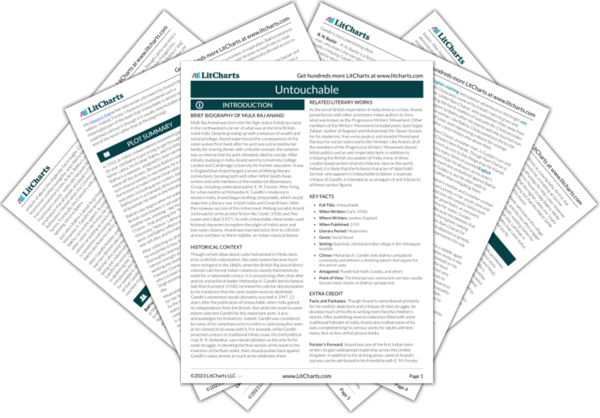Throughout Untouchable, English clothing symbolizes the way Bakha and his friends have internalized their village’s hierarchies of race and class. Sweeper Bakha, his brother Rakha, and his best friends Ram Charan and Chota are fascinated by English materials, hats, and cigarettes. Bakha spends almost all of his income on imported blankets and pants, even though they fail to keep him warm in the winter; Ram Charan wears a sunhat and shorts to his sister’s wedding simply because he imagines that even casual British “fashun” is inherently more formal than traditional Indian dress. But while the boys all mock each other for their shared obsession with such “fashun,” this focus on appearance flows naturally from the rigid caste delineations they have grown up with. To signal his low status, Bakha must wear khaki while the rest of his neighbors wear white and higher-caste villagers wear special robes to denote their position as leaders or upper-crust Brahmin priests. And, since the narrative takes place 10 years before India’s independence movement succeeded, a British officer’s uniform holds almost infinite sartorial power and prominence. It follows, then, that Bakha and his friends’ desire to wear European sunhats (known as “topees”) and smoke “Red Lamp” cigarettes is far more than an aesthetic longing. It is instead a natural response to caste and colonialism—though they are forced to the bottom of overlapping race and class hierarchies, dressing in starched pants and jackets allows Bakha and his friends to blur visually the categories they otherwise cannot change.
English Clothes Quotes in Untouchable
[Bakha] had had glimpses, during his sojourn there, of the life the Tommies lived, sleeping on strange, low canvas beds covered tightly with blankets, eating eggs, drinking tea and wine in tin mugs, going to parade and then walking down to the bazaar with cigarettes in their mouths and small silver-mounted canes in their hands. And he had soon become possessed with an overwhelming desire to live their life. He had been told they were sahibs, superior people. He had felt that to put on their clothes made one a sahib too. So he tried to copy them in everything, to copy them as well as he could in the exigencies of his peculiarly Indian circumstances.
As a child, Bakha had often expressed a desire to wear rings on his fingers, and liked to look at his mother adorned with silver ornaments. Now that he had been to the British barracks and known that the English didn’t like jewelry, he was full of disgust for the florid, minutely-studded designs of the native ornaments. So he walked along without noticing the big earrings and nose-rings and hair-flowers and other gold-plated ornaments which shone out from the background of green paper against which the smiths had ingeniously set them.
There wasn’t a child about the 38th Dogras who hadn't cast lingering eyes at this hat. The spirit of modernity had worked havoc among the youth of the regiment. The consciousness of every child was full of a desire to wear Western dress, and since most of the boys about the place were the sons of babus, bandsmen, sea poise, sweepers, washermen and shopkeepers, all too poor to afford the luxury of a complete European outfit, they eagerly stretched their hands to seize any particular article they could see anywhere, feeling that the possession of something European was better than the possession of nothing European.
‘Yes, Sahib, I know,’ said Bakha, without understanding the subtle distinction which the Colonel was trying to institute between himself and the ordinary sahibs in India whose haughtiness and vulgarity was, to his Christian mind, shameful, and from whom, on that account, he took care to distinguish himself, lest their misdeeds reflect on the sincerity of his intentions for the welfare of the souls of the heathen. To Bakha, however, all the sahibs were sahibs, trousered and hatted men, who were generous in the extreme, giving away their cast-off clothes to their servants, also a bit nasty because they abused their servants a great deal.
Bakha saw a sallow-faced Englishman, whom he knew to be the District Superintendent of Police, standing by the roadside in a khaki uniform of breaches, polished leather gators and blue-puggareed, khaki sun helmet, not as smart as the military officers’, but, of course, possessing for Bakha all the qualities of the sahibs’ clothes. Somehow, however, at this moment Bakha was not interested in sahibs, probably because in the midst of this enormous crowd of Indians, fired with enthusiasm for their leader, the foreigners seemed out of place, insignificant, the representative of an order which seemed to have nothing to do with the natives.












